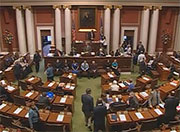
WEDNESDAY, Jan. 28, 2015 (HealthDay News) — Liberals are in luck when it comes to longevity, new research contends.
Compared to people with conservative and moderate political ideologies, liberals were less likely to die over the course of a 30-year review. But party lines did not determine life span, with Independents faring better than Republicans and Democrats, according to the study published Jan. 28 in the Journal of Epidemiology & Community Health.
Researchers not involved with the study were divided over what — if anything — the findings proved.
While the study authors tried to account for the influence of factors like race, education level and income, they didn’t have any data regarding life choices such as diet, smoking and exercise. Liberals and Independents could simply be living more healthy lifestyles than other people, or the connection may be a coincidence, the researchers noted.
To complicate matters, liberals lived longer than Democrats.
Still, “there’s got to be something going on,” said study author Roman Pabayo, an assistant professor with the School of Community Health Sciences at the University of Nevada at Reno. Political views, he said, are “definitely a marker for something.”
Researchers know a bit about how ideologies affect lives. According to Pabayo, “liberals are more likely to look at inequality in a negative way, while conservatives are considered more likely to be happier.” But there’s been little research into how political views may affect how long people live.
For the new study, Pabayo and his colleagues tracked almost 33,000 adults in the United States for about three decades. The researchers followed the volunteers, who joined the study between 1976 and 2008, for an average of 15 years.
The participants answered questions about their political views, although they didn’t fit easily into boxes: Liberals weren’t necessarily Democrats, and conservatives weren’t necessarily Republicans. The study didn’t analyze where their views fit along the political spectrum; it was only based on what the participants thought of themselves.
Almost 30 percent of the participants died during the study, Pabayo said. After adjusting the statistics to compensate for high or low numbers of people who shared certain traits like race or age, the researchers found that 33 percent of Democrats died, compared to 28 percent of Republicans and 23 percent of Independents.
When it came to political ideologies, 30 percent of conservatives and moderates died, compared to 25 percent of liberals.
Pabayo suspects that political views may serve as stand-ins for other factors that might affect life span, but he couldn’t say what they were. “I don’t think it’s accurate to say everyone should be a liberal,” he said. “Being a liberal is a marker for something else.”
S.V. Subramanian, a professor of population health and geography at the Harvard School of Public Health in Boston, was skeptical of the study, noting that the difference between groups was small and “the findings are somewhat inconsistent.”
“No meaningful conclusions should be drawn from this study,” he said, since “the definitions of liberal and conservative are so ambiguous.”
Dr. Christian Gericke, chief executive officer of The Wesley Research Institute in Auchenflower, Australia, endorsed the study, saying this kind of research “serves to quell our thirst for understanding the power of political beliefs on health outcomes to some extent.”
More information
Visit the U.S. Office of Disease Prevention and Health Promotion for tips on general health.
Copyright © 2026 HealthDay. All rights reserved.

